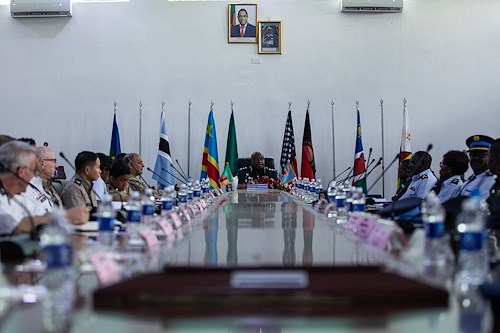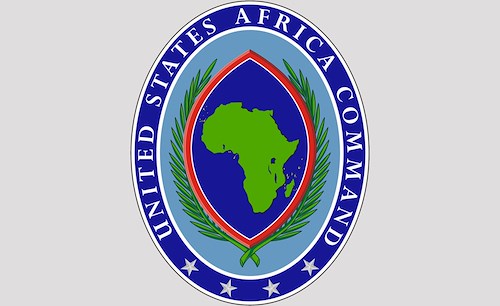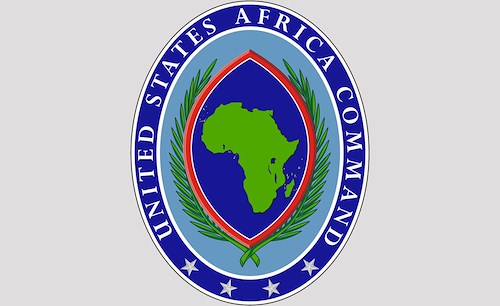The House Armed Services Committee, as part of its responsibility to oversee the U.S. military, has asked for more information about the roles and missions of U.S. Africa Command (AFRICOM). The committee also has discussed an initiative to assist West African nations in reducing the flow of narcotics, as well as proposed changes within U.S. Southern Command that would reflect structural innovations being pioneered by U.S. Africa Command.
The language is contained in the House Armed Services Committee report on the Fiscal 2009 defense authorization bill, House Resolution (H.R.) 5658, released May 16, 2008. The 683-page committee report examines the entire defense budget and is part of the annual federal budget process.
The Senate Armed Services Committee is developing parallel legislation, and the two versions will be reconciled to create the authorization act for the U.S. armed forces for the fiscal year that begins October 1, 2008.
With regard to the U.S. Africa Command, committee members were in agreement with AFRICOM's posture statement that a stable Africa is in the best interest of the United States. However, they expressed reservations relating to its specific roles and missions. Of primary concern was the committee's perception that AFRICOM could give the appearance of militarizing U.S. foreign policy by taking over responsibilities traditionally held by government agencies and other departments. On page 412, the report lists examples of tasks that "appear to depart from traditional Department of Defense (DoD) missions, including medical HIV/AIDS assistance, humanitarian assistance, and disaster relief."
Furthermore, the committee disapproved of the lack of consultation with Congress during Africa Command's conception. While it was acknowledged on page 412 of the report that "there is no statutory requirement for the Department of Defense to consult with Congress" before making a change to the Unified Command Plan, the committee believes that "an opportunity to provide input to the Department of Defense during the conception and early stages of development of the command would have been beneficial to all."
To address these concerns, the committee has directed the Secretary of Defense to submit a report to the Senate Committee on Armed Services, the Senate Committee on Foreign Relations and the House Committee on Foreign Affairs by one week prior to October 1, 2008.
The committee asked that the report contain a description of the roles and missions of AFRICOM, as well as responses to several questions posed by the House Armed Services Committee. The five questions request further clarification on: the current and future size and scope of the U.S. military footprint on the continent; the perceptions of African communities and organizations on AFRICOM; Africa Command's anticipated involvement in stabilization and reconstruction activities; its estimated total cost of establishing the command; and finally, the challenges Africa Command anticipates as it fills inter-agency positions.
For the complete text of these questions, refer to page 412 and 413 of the report (linked below).
Drug Trafficking in Africa
Among Africa Command's tasks in striving for security and stability on the African continent is its plan to support efforts to reduce drug trafficking, especially prevalent in the vast, coastal areas of West Africa. The House Armed Services Committee proposed an authority which would support these efforts by expanding the list of countries that qualify for DoD counter-drug assistance to include three countries of Africa and increasing funding for these efforts.
Section 1024, titled "Expansion and Extension of Authority to Provide Additional Support for Counter-drug Activities of Certain Foreign Governments," would provide funding for counter-drug equipment in the Republic of Ghana, the Republic of Guinea-Bissau, and the Republic of Senegal, in addition to the nations of the Western Hemisphere, central Asia, and the Caucasus.
According to the House of Armed Services Committee, Section 1024 of the authorization bill would also extend, by one fiscal year, the authority of the DoD to provide financial support for counter-drug activities of foreign governments, and would increase funding for counter-narcotic programs from $60 million to $65 million.
The proposed motion to include African countries in DoD's counter-narcotic trafficking efforts was partly based on the 2008 International Narcotics Control Strategy Report of the Department of State, which states that "Ghana has become a significant transshipment point for illegal drugs, particularly cocaine from South America, as well as heroin from Southeast and Southwest Asia." Additionally, Guinea-Bissau, while not a major producer of illicit drugs, was identified by President George W. Bush as a "warehouse refuge and transit hub for cocaine traffickers from Latin America transporting cocaine to Western Europe."
Section 1025, titled "Comprehensive Department of Defense Strategy for Counter-narcotics Efforts for West Africa and the Maghreb," would further support DoD's counter-narcotics programs by requiring that the Secretary of Defense, in consultation with the Secretary of State prepare a "a region-wide, counter-drug plan for Africa, with a special emphasis on West Africa and the Maghreb."
For a full report on counter-drug activity legislation, refer to pages 429-431 of the report.
Temporary Expansion of the Joint Inter-Agency Task Force-South
In acknowledgement of Africa Command's limited resources to establish a counter-narcotics program, the House Armed Services Committee recommended, on page 421 of its report, that the Joint Operating Area (JOA) of the Joint Inter-Agency Task Force-South (JIATF-S) be temporarily expanded to include Africa as another one of its areas of responsibility.
With this change, Africa Command's future counter narco-terrorism office, which is scheduled to be established by October 1, 2008, would be able to rely on analyst support from the JIATF-S in various U.S. embassies in Africa.
JIATF-S's primary mission is to "detect, monitor, and support interdiction of the south-to-north flow of illicit drugs and other narco-terrorist threats to the security of the U.S. within the prescribed JOA."
The committee emphasized that Africa would only be a temporary expansion to JIATF-S's area of responsibility to avoid jeopardizing ongoing and future operations of the task force. To ensure a smooth transition from JIATF-S over to Africa Command's counter narco-terrorism office, the committee directed the Commander of AFRICOM, General Kip Ward, to report to the Senate Committee on Armed Services and the House Committee on Armed Services by March 1, 2009.
During this meeting, Ward will be expected to report on "AFRICOM's overall counter-narcotics strategy, the identification of priorities for counter-narcotic efforts in AFRICOM's area of responsibility, particularly in West Africa; the role that JIATF-S will temporarily play in meeting these objectives; and the role of international and regional partnerships in executing the same."
Restructuring of the United States Southern Command
The committee's discussion of the United States Southern Command (SOUTHCOM) on page 410 of the report focused primarily on the command's efforts to transform its structure, mission statement, and activities to reflect that of the U.S. Africa Command.
As part of its transformation, SOUTHCOM has already established joint inter-agencies within the command and assigned a director of inter-agency partnering to lead the efforts and facilitate the transformation. The command plans to align the transformation with AFRICOM, setting its completion goal for October 1, 2008, also the date of AFRICOM's transition to full operating capacity.
On page 410, the report states, "Ultimately, SOUTHCOM envisions shifting to 'mission-centric' directorates as African Command is implementing, from having Directorates which are based upon traditional Joint Staffing."
The four proposed directorates include a directorate for strategy and policy, a directorate for security and intelligence, a directorate for stability, and a directorate for inter-agency partners. Each of these directors would be supported by two offices, including one for resources and management and one for enterprise support.
According to SOUTHCOM, this new structure will help address national security problems by relying on the skills and expertise of interagency partners across the U.S. government. Among SOUTHCOM's interagency goals is one that states, to "ensure SOUTHCOM has a 21st century facility to meet the challenges of the future. The new facility must enable discussions across the command and the interagency as well as throughout the region encompassing all levels of unclassified, proprietary, and classified information."
In addition, SOUTHCOM plans to alter its mission statement to reflect an elevation in stability operations and prosperity-generating activities to the same level as its security activities.
The House Armed Services Committee acknowledged its overall support for SOUTHCOM's efforts to transform its structure to more effectively meet the challenges of the 21st century, but expressed a number of concerns, relating to the roles of the inter-agencies, the operability between SOUTHCOM and more traditional commands, and its stated missions and plans.
The committee requested a written response, due July 31, 2008, by the Secretary of Defense, in consultation with the Secretary of State, describing:
how SOUTHCOM will interface laterally with other Combatant Commands that maintain the tradition joint directorate structures;
the duties and responsibilities of the two proposed deputy commanders;
a description of the warfighting chain of command, as required under title 10, United States Code;
its plan to manage and evaluate its internal transformation and measure its progress;
the role of foreign assistance agencies in the delivery of assistance by SOUTHCOM and other COCOMs;
the relevance of including the economic welfare of a region, specifically Central and South America and the Caribbean, within the core of its mission;
the role that the DoD and COCOMs should have in establishing foreign assistance policy as part of the foreign assistance process at the Department of State; and
the Department's plan to incorporate lessons learned from SOUTHCOM's inter-agency transformation into other COCOMs aside from the AFRICOM.
For a complete summary of the SOUTHCOM report, refer to pages 409 to 410.
Human Terrain Team Support
Finally, the committee recommended establishing at least one Human Terrain Team (HTT) for each regional combatant command, including the Pacific Command, the Southern Command, and the Africa Command.
HTTs provide support to the military by providing anthropological expertise on a specific region and culture, thus promoting understanding and providing warfighters with non-kinetic options in planning and carrying out their missions. HTTs were described by the committee to be "critical enablers to shaping military planning in pre-conflict environments, and are supportive of reconstruction and stabilization efforts."
The HTTs have proven to be valuable in Iraq and Afghanistan where kinetic operations were reported to be reduced by more than 60 percent. For this reason, the believes their support would be equally valuable in support of combatant commands.
The full report is posted on the Website of the House of Representatives Armed Services Committee at the link below:




